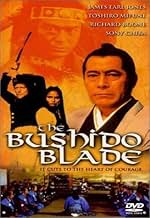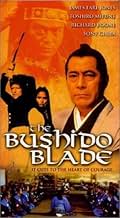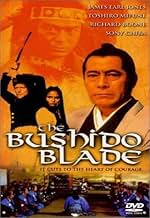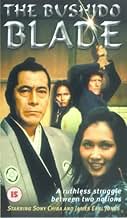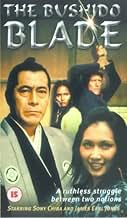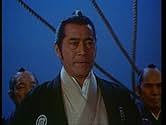Adicionar um enredo no seu idiomaA steel samurai blade that was to be given to the American ambassador by the Emperor of Japan is stolen. American sailors and Japanese samurai are sent to find it.A steel samurai blade that was to be given to the American ambassador by the Emperor of Japan is stolen. American sailors and Japanese samurai are sent to find it.A steel samurai blade that was to be given to the American ambassador by the Emperor of Japan is stolen. American sailors and Japanese samurai are sent to find it.
Mike Starr
- Bos'n Cave Johnson
- (as Michael Starr)
Timothy Patrick Murphy
- Midshipman Robin Burr
- (as Timothy Murphy)
Shin'ichi Chiba
- Prince Ido
- (as Sony Chiba)
Hitoshi Ômae
- Sumo
- (as Kin Omai)
Avaliações em destaque
I feel absolutely terrible giving a Toshiro Mifune film 4/10, but I could not do otherwise and remain honest. Frankly, the only acting in this movie that didn't leave me cringing was from the three main Japanese actors, (Sonny Chiba, Toshiro Mifune and Mako) and James Earl Jones who only had a tiny part. Frank converse didn't do a terrible job, but it wasn't a very enthusiastic performance. The rest of the actors deserve little more than scorn. Commodore Perry (Richard Boone) left me absolutely cringing every time he opened his mouth.
Frankly there was little, if anything, in this movie to recommend watching it. The culture is portrayed in a caricature manner, if not outright incorrectly. The history is wrong. The acting is terrible. The action scenes are decent, but not worth much.
I wouldn't say avoid this movie at all costs, but don't go out of your way to see it either.
Frankly there was little, if anything, in this movie to recommend watching it. The culture is portrayed in a caricature manner, if not outright incorrectly. The history is wrong. The acting is terrible. The action scenes are decent, but not worth much.
I wouldn't say avoid this movie at all costs, but don't go out of your way to see it either.
Bushido Blade is a film that kind of got lost with all the hoopla surrounding the Shogun TV mini-series. Commodore Perry's opening of Japan deserved a better treatment than what it got here.
No reflection on the cast, they certainly try hard enough. And the making of the film is a service of sorts because America is woefully ignorant about Japan other than knowing that they were our opponents in World War II.
Making his farewell appearance on the screen is Richard Boone as the crusty Commodore Matthew Calbraith Perry. From what little I know of Perry, Boone seems to have captured him very well. Perry was the younger brother of Oliver Hazard Perry who was the commander of the Great Lakes Navy that beat the British and kept them from invading us through Canada. Younger brother Cal (family and friends used Perry's middle name when addressing him)served in the United States Navy for over 30 years and the opening of Japan was the capstone of a great career.
Bushido Blade is a fictional sideline to the true events surrounding the treaty Perry signed with the Shogun. There was a faction in Japan who wanted to keep the country's isolationist policy going and were quite willing to do anything in that endeavor. They steal a ceremonial samurai sword that is to be presented to President Franklin Pierce by Perry. As this is a question of honor, the Japanese balk at signing the treaty at the last minute.
The Japanese insist on themselves recovering the sword, but Perry unofficially sends Marine Captain Frank Converse, Boatswain Mike Starr, and young Naval Midshipman Timothy Patrick Murphy on his own mission. The three get split up during an attack. The bulk of the film is the separate experiences of all three.
Frank Converse is a fine actor, but I couldn't quite believe him as an instant Samurai. When he has to battle the champion Samurai he gets a bit of help to say the least. Skill with a Samurai sword is not something one learns on the job or on the fly and by rights he should never have survived.
Young Timothy Patrick Murphy cuts a fine romantic figure as his odyssey includes a small romantic interlude with a young Japanese girl who is intrigued by this occidental who speaks her language. Murphy reminded me just a bit of Tyrone Power in Son of Fury. It was sad indeed that he died so young of AIDS, he had a great career ahead of him.
Such fine Japanese players as Toshiro Mifune, Tetsuro Tamba, and Mako fill their roles well. I very much enjoyed James Earl Jones who played a whaling harpooner who was a prisoner. Before the treaty was signed with Japan, sailors from the west who had the misfortune to be shipwrecked in Japan could expect never to see home again.
The Bushido Blade is an average film about a key incident in both American and Japanese history. It could have used a lot more of everything, direction, production values, editing. But the players did their best with it.
A good triple feature one day might be watching The Barbarian and the Geisha even with a woefully miscast John Wayne, The Bushido Blade, and the best film on 19th century Japan after the opening, The Last Samurai with Tom Cruise. It's a chance to see the Japanese as more than our enemies in World War II or having their city's destroyed by some prehistoric beast.
No reflection on the cast, they certainly try hard enough. And the making of the film is a service of sorts because America is woefully ignorant about Japan other than knowing that they were our opponents in World War II.
Making his farewell appearance on the screen is Richard Boone as the crusty Commodore Matthew Calbraith Perry. From what little I know of Perry, Boone seems to have captured him very well. Perry was the younger brother of Oliver Hazard Perry who was the commander of the Great Lakes Navy that beat the British and kept them from invading us through Canada. Younger brother Cal (family and friends used Perry's middle name when addressing him)served in the United States Navy for over 30 years and the opening of Japan was the capstone of a great career.
Bushido Blade is a fictional sideline to the true events surrounding the treaty Perry signed with the Shogun. There was a faction in Japan who wanted to keep the country's isolationist policy going and were quite willing to do anything in that endeavor. They steal a ceremonial samurai sword that is to be presented to President Franklin Pierce by Perry. As this is a question of honor, the Japanese balk at signing the treaty at the last minute.
The Japanese insist on themselves recovering the sword, but Perry unofficially sends Marine Captain Frank Converse, Boatswain Mike Starr, and young Naval Midshipman Timothy Patrick Murphy on his own mission. The three get split up during an attack. The bulk of the film is the separate experiences of all three.
Frank Converse is a fine actor, but I couldn't quite believe him as an instant Samurai. When he has to battle the champion Samurai he gets a bit of help to say the least. Skill with a Samurai sword is not something one learns on the job or on the fly and by rights he should never have survived.
Young Timothy Patrick Murphy cuts a fine romantic figure as his odyssey includes a small romantic interlude with a young Japanese girl who is intrigued by this occidental who speaks her language. Murphy reminded me just a bit of Tyrone Power in Son of Fury. It was sad indeed that he died so young of AIDS, he had a great career ahead of him.
Such fine Japanese players as Toshiro Mifune, Tetsuro Tamba, and Mako fill their roles well. I very much enjoyed James Earl Jones who played a whaling harpooner who was a prisoner. Before the treaty was signed with Japan, sailors from the west who had the misfortune to be shipwrecked in Japan could expect never to see home again.
The Bushido Blade is an average film about a key incident in both American and Japanese history. It could have used a lot more of everything, direction, production values, editing. But the players did their best with it.
A good triple feature one day might be watching The Barbarian and the Geisha even with a woefully miscast John Wayne, The Bushido Blade, and the best film on 19th century Japan after the opening, The Last Samurai with Tom Cruise. It's a chance to see the Japanese as more than our enemies in World War II or having their city's destroyed by some prehistoric beast.
The picture develops the true tale of commandant Perry (Richard Boone's final show) -along with his underlings- who during the nineteenth century is sent by the US President to Japan to serve as the first U.S. As in 1852 , Perry was assigned a mission by American President Millard Fillmore to force the opening of Japanese ports to American trade , through the use of gunboat diplomacy if necessary Consul-General to that country . Perry (considered father of the Steam Navy) finally reached Uraga at the entrance to Edo Bay in Japan on July 8 , 1853 . In the meantime , the Japanese government was paralyzed due to the incapacitation by illness of Shogun Tokugawa Ieyoshi and by political indecision on how to handle the unprecedented threat to the nation's capital . Later on , a steel samurai blade that was to be given by the Japanese high authority (Toshiro Mifune) to the American ambassador from the Emperor of Japan is stolen . After that , American sailors : Bos'n Cave Johnson (Mike Starr), Midshipman Robin Burr (Timothy Patrick Murphy) , Captain Lawrence (Frank Converse) and Japanese samurai (Sonny Chiba) are sent to find it . They discover enormous hostility to foreigners, as well as dangers and risks . There Robin finds romance with a gorgeous girl and Captain Lawrence meets a samurai woman (Laura Gemser) . Meanwhile , they confront the Shogun army , and Lord Yamato (Tetsurô Tanba) . The Japanese attackers follow the Bushido code , it means honor but also revenge , bloodshed and violent death! . The Bushido blade cuts to the heart of courage .
Richard Boone becomes the first Ambassador from the Western world is this oriental adventure . The film deals with conflicts between the radical conservatism and modernism ; upon relation of the West and East World . In addition , a sweeping , human drama with all the ingredients : adventures , betrayal , romance , inter-racial love story , emotions , breathtaking battles , spellbound scenarios and results to be pretty interesting . Stunning images illuminate the full-blown feats of a bunch of sailors under impressive Japanese sets . It's an acceptable epic in medium budget , including an agreeable statement about honor , tradition and futility of war . Glimmer and colorfully cinematography shot on location in London , England, UK and Tokyo , Japan ; though a perfect remastering is necessary . Evocative and appropriate score , including a catching leitmotif , by Maury Laws . Panned by the critics , the movie was a flop at box office in USA , receiving awful reviews . However , nowadays is best deemed . The motion picture was professionally directed by Tom Kotani , though it has some gaps as well as flaws and uneven pacing .
This costumer picture is based on historic events . As Perry returned in 1854 with ten ships and 1600 men and he carried out the Opening of Japan , as called The Perry Expedition: 1852–1854 . After initial resistance by the Japanese , Perry was permitted to land at Kanagawa, near the site of present-day Yokohama where after negotiations lasting for around a month , the Convention of Kanagawa . Perry signed as American plenipotentiary, and Akira signed for the Japanese side. Perry departed , mistakenly believing the agreement had been made with imperial representatives , not understanding the true position of the Shogun, the de facto ruler of Japan . As Japan was dominated for a dynasty occupied by the Togugawa family from century XVI until 1868 and characterized by ruling ¨Daimios ¨ , confronting occidental people and shunning the opening imposed by Admiral Perry in 1863 ; he was the first foreigner in Japan who undergoes a culture shock . Being dead emperor Komei , succeeded in 1867 , Mutsu Hito , one time crowned as emperor Meiji , he abolished the Shogun . Matsu Hito carried out various changes, as a liberal cabinet , creating a Duma or Parliament and following actual models and modern spirit . Anti-reforms riots to return old values , traditional way of life and code Bushido were realized by the Samurais a type of medieval knight for preventing of occidental life style . These events have been developed in various films as ¨Barbarian and Geisha¨ by John Huston , considering John Wayne is horribly miscast that resulted to be one of the worst of his bad films , ¨The last Samurai¨ by Edward Zwick with Tom Cruise , Ken Watanabe , Billy Connolly , Tony Goldwyn and the magnificent TV series ¨Shogun¨ (1980) with Richard Chamberlain . Although ¨The Bushido blade¨ was derided as an attempt to copy the hit TV mini-series "Shogun", it was actually made in 1980, before "Shogun", though it wasn't released until after that series had aired .
Richard Boone becomes the first Ambassador from the Western world is this oriental adventure . The film deals with conflicts between the radical conservatism and modernism ; upon relation of the West and East World . In addition , a sweeping , human drama with all the ingredients : adventures , betrayal , romance , inter-racial love story , emotions , breathtaking battles , spellbound scenarios and results to be pretty interesting . Stunning images illuminate the full-blown feats of a bunch of sailors under impressive Japanese sets . It's an acceptable epic in medium budget , including an agreeable statement about honor , tradition and futility of war . Glimmer and colorfully cinematography shot on location in London , England, UK and Tokyo , Japan ; though a perfect remastering is necessary . Evocative and appropriate score , including a catching leitmotif , by Maury Laws . Panned by the critics , the movie was a flop at box office in USA , receiving awful reviews . However , nowadays is best deemed . The motion picture was professionally directed by Tom Kotani , though it has some gaps as well as flaws and uneven pacing .
This costumer picture is based on historic events . As Perry returned in 1854 with ten ships and 1600 men and he carried out the Opening of Japan , as called The Perry Expedition: 1852–1854 . After initial resistance by the Japanese , Perry was permitted to land at Kanagawa, near the site of present-day Yokohama where after negotiations lasting for around a month , the Convention of Kanagawa . Perry signed as American plenipotentiary, and Akira signed for the Japanese side. Perry departed , mistakenly believing the agreement had been made with imperial representatives , not understanding the true position of the Shogun, the de facto ruler of Japan . As Japan was dominated for a dynasty occupied by the Togugawa family from century XVI until 1868 and characterized by ruling ¨Daimios ¨ , confronting occidental people and shunning the opening imposed by Admiral Perry in 1863 ; he was the first foreigner in Japan who undergoes a culture shock . Being dead emperor Komei , succeeded in 1867 , Mutsu Hito , one time crowned as emperor Meiji , he abolished the Shogun . Matsu Hito carried out various changes, as a liberal cabinet , creating a Duma or Parliament and following actual models and modern spirit . Anti-reforms riots to return old values , traditional way of life and code Bushido were realized by the Samurais a type of medieval knight for preventing of occidental life style . These events have been developed in various films as ¨Barbarian and Geisha¨ by John Huston , considering John Wayne is horribly miscast that resulted to be one of the worst of his bad films , ¨The last Samurai¨ by Edward Zwick with Tom Cruise , Ken Watanabe , Billy Connolly , Tony Goldwyn and the magnificent TV series ¨Shogun¨ (1980) with Richard Chamberlain . Although ¨The Bushido blade¨ was derided as an attempt to copy the hit TV mini-series "Shogun", it was actually made in 1980, before "Shogun", though it wasn't released until after that series had aired .
It's always a little fascinating when a filmmaker undertakes a production at least partly outside their own country, and at least partly in another language. I would love the chance to read all about international co-productions like this, and learn how they came into being. What makes this instance particularly interesting, for good or maybe mostly for ill, is the ultimate form that it took, which is plainly evident very early on. Japanese filmmaker Kotani Tsugunobu may be directing (credited as "Tom Kotani"), and much of the picture may have been filmed in Japan with the cooperation of Toho. Why, much of the cast and crew is Japanese, including icons Mifune Toshiro and Sonny Chiba. Yet between the involvement of famed U. S. producers Rankin/Bass, and the screenplay of U. S. writer William Overgard, far more than not 'The bushido blade' absolutely feels from top to bottom like an exclusively Hollywood affair, and often in the worst of ways. This doesn't mean that it's not enjoyable - it is, to one degree or another - but the sincerity of it all is very much in question, and I'm also curious just how the contributors viewed their participation in retrospect.
Let's not beat around the bush: this does not treat Japan, its culture, or its people well. At best the feature offers a hopelessly simplified interpretation and depiction, and at worse the ignorant racism and jingoism of the nineteenth-century American characters is extended to the sensibilities with which the Japanese are portrayed. The Americans are roundly arrogant, with a conflated sense of self, virtue, and superiority; even when the script doesn't have the Americans specifically looking down on Japan as a backwards, quaint nation of "savages," the Americans are made out to be the definite heroes, and the Japanese to be the definite villains. And the thing is, despite the premise, there actually isn't a lot of room for nuance in this flick, for the characterizations are reduced and heavy-handed, if not purely archetypal or stereotypical - and the plot isn't far behind. One boyish, kindhearted sailor happens to have studied the language; his beefy uncle is much more physical and oafish; their designated leader will quizzically be dubbed an honorary samurai after being on Japanese soil for all of one day. One Japanese woman is soft and demure; one (played by Indonesian-Dutch actress Laura Gemser) is more dubious yet as she is The Fiery Warrior, The Warrior Poet, The Soft Woman, and The Romantic Interest all rolled into one.
I can forgive the very ahistorical story appended to a reimagined rendition of Commodore Perry arriving in Japan in the 1850s. I'm more concerned about the characters that fill discrete narrative roles, but without any hint of depth or nuance. I'm more concerned about how the scene writing flimsily tosses in sundry odds and ends that emphatically say "Japan!" for those viewers whose only experience with the Land of the Rising Sun is what they've seen or heard poorly represented on television: samurai, a violent code of honor, a long history of isolation, earthquakes. I'm certainly more concerned about how the plot at large seems rather loose, defined more by (a) some small set number of essential beats, and otherwise (b) general vibes, more than cogency, cohesiveness, or a mind for impactful drama or thrills. And I'm concerned by how even beyond conception and conjuration, the execution of this flick is wanting. Save for some nudity and greater levels of violence, this often comes across like the sort of highfalutin, "pip pip!" live-action adventure fare that Disney churned out in previous years. This sense comes from the writing, certainly, but also from the decided lack of polish in too many action sequences, as if professional stunt coordinators and fight choreographers weren't a thing. (At least "dueling master" Kuze Ryu shows that his involvement was not for nothing.) Sometimes it almost feels like Kotani was director in name only, and some unnamed American counterpart was actually in charge to see that all possible clichés and empty, tiresome tropes made their way in.
Sure, the filming locations are beautiful. The costume design is pretty sharp, and the production design and art direction. Some of the stunts and effects are better than others. It's reasonably well made. The movie is still entertaining to some extent, and I don't regret watching. But this needed so badly to be written and made more carefully, with more input from Kotani and Toho, and with less from Rankin/Bass. I don't know where precisely the responsibility lies for how this turned out, but I really have to wonder just how everyone felt about it when all was said and done as a title that frankly does a disservice to Japan and which in no meaningful way evinces anything except Hollywood with its all too common misrepresentations of This or That. Chiba is wasted here, and Mifune even more so; the same could surely be said for other stars. 'The bushido blade' is okay if you happen to come across it, but even if you're a huge fan of someone involved, there's no major reason to check it except as something light to pass the time on a quiet day. Maybe that's all it needed to be, but I expected something more solid and sure-footed.
Let's not beat around the bush: this does not treat Japan, its culture, or its people well. At best the feature offers a hopelessly simplified interpretation and depiction, and at worse the ignorant racism and jingoism of the nineteenth-century American characters is extended to the sensibilities with which the Japanese are portrayed. The Americans are roundly arrogant, with a conflated sense of self, virtue, and superiority; even when the script doesn't have the Americans specifically looking down on Japan as a backwards, quaint nation of "savages," the Americans are made out to be the definite heroes, and the Japanese to be the definite villains. And the thing is, despite the premise, there actually isn't a lot of room for nuance in this flick, for the characterizations are reduced and heavy-handed, if not purely archetypal or stereotypical - and the plot isn't far behind. One boyish, kindhearted sailor happens to have studied the language; his beefy uncle is much more physical and oafish; their designated leader will quizzically be dubbed an honorary samurai after being on Japanese soil for all of one day. One Japanese woman is soft and demure; one (played by Indonesian-Dutch actress Laura Gemser) is more dubious yet as she is The Fiery Warrior, The Warrior Poet, The Soft Woman, and The Romantic Interest all rolled into one.
I can forgive the very ahistorical story appended to a reimagined rendition of Commodore Perry arriving in Japan in the 1850s. I'm more concerned about the characters that fill discrete narrative roles, but without any hint of depth or nuance. I'm more concerned about how the scene writing flimsily tosses in sundry odds and ends that emphatically say "Japan!" for those viewers whose only experience with the Land of the Rising Sun is what they've seen or heard poorly represented on television: samurai, a violent code of honor, a long history of isolation, earthquakes. I'm certainly more concerned about how the plot at large seems rather loose, defined more by (a) some small set number of essential beats, and otherwise (b) general vibes, more than cogency, cohesiveness, or a mind for impactful drama or thrills. And I'm concerned by how even beyond conception and conjuration, the execution of this flick is wanting. Save for some nudity and greater levels of violence, this often comes across like the sort of highfalutin, "pip pip!" live-action adventure fare that Disney churned out in previous years. This sense comes from the writing, certainly, but also from the decided lack of polish in too many action sequences, as if professional stunt coordinators and fight choreographers weren't a thing. (At least "dueling master" Kuze Ryu shows that his involvement was not for nothing.) Sometimes it almost feels like Kotani was director in name only, and some unnamed American counterpart was actually in charge to see that all possible clichés and empty, tiresome tropes made their way in.
Sure, the filming locations are beautiful. The costume design is pretty sharp, and the production design and art direction. Some of the stunts and effects are better than others. It's reasonably well made. The movie is still entertaining to some extent, and I don't regret watching. But this needed so badly to be written and made more carefully, with more input from Kotani and Toho, and with less from Rankin/Bass. I don't know where precisely the responsibility lies for how this turned out, but I really have to wonder just how everyone felt about it when all was said and done as a title that frankly does a disservice to Japan and which in no meaningful way evinces anything except Hollywood with its all too common misrepresentations of This or That. Chiba is wasted here, and Mifune even more so; the same could surely be said for other stars. 'The bushido blade' is okay if you happen to come across it, but even if you're a huge fan of someone involved, there's no major reason to check it except as something light to pass the time on a quiet day. Maybe that's all it needed to be, but I expected something more solid and sure-footed.
Great cast. Too bad the rest of it couldn't match up.
Richard Boone plays a growling Cmmdr. Perry in his last role. And REALLY chews it up.
Frank (Coronet Blue) Converse (The real star) attempts to be an action hero. Not enough action though. And He's a little wooden.
Any Asian actor with a name dropped by for a cameo. Seeing the late, great Toshiro Mifune reprise most of his previous samurai roles was nice. And Sonny Chiba's warrior cliché is something I never get tired of. Then there's Mako as the cliché' wise man.
Laura (GODDESS) Gemser showing up made it worth the price of a rental. (To me anyway. She is GORGEOUS.) Seeing a young Mike Starr was kind of cool. He was obviously meant to be comedy relief.
James Earl Jones role should have been larger. Is this film still cut? An adventure story about finding a stolen sword could have and should have been a lot better.
And that minstrel show on the ship might anger a few people...even if it is based on facts of the times.
Not a waste...not unmissable either.
Richard Boone plays a growling Cmmdr. Perry in his last role. And REALLY chews it up.
Frank (Coronet Blue) Converse (The real star) attempts to be an action hero. Not enough action though. And He's a little wooden.
Any Asian actor with a name dropped by for a cameo. Seeing the late, great Toshiro Mifune reprise most of his previous samurai roles was nice. And Sonny Chiba's warrior cliché is something I never get tired of. Then there's Mako as the cliché' wise man.
Laura (GODDESS) Gemser showing up made it worth the price of a rental. (To me anyway. She is GORGEOUS.) Seeing a young Mike Starr was kind of cool. He was obviously meant to be comedy relief.
James Earl Jones role should have been larger. Is this film still cut? An adventure story about finding a stolen sword could have and should have been a lot better.
And that minstrel show on the ship might anger a few people...even if it is based on facts of the times.
Not a waste...not unmissable either.
Você sabia?
- CuriosidadesAlthough this film was derided as an attempt to copy the hit TV mini-series Shogun (1980), it was actually made in 1978, before Shogun (1980), though it wasn't released until after that series had aired.
- Cenas durante ou pós-créditosThe producers gratefully acknowledge the cooperation of Toho Studios staff and personnel in the production of this picture.
- Versões alternativasFirst shown in USA in a 92-minute version on cable television, prior to a theatrical release in the USA of the complete 104-minute version, this retitled "The Bloody Bushido Blade."
- ConexõesFeatured in Vintage Video: 0249 The Bushido Blade (1981) (2021)
Principais escolhas
Faça login para avaliar e ver a lista de recomendações personalizadas
- How long is The Bushido Blade?Fornecido pela Alexa
Detalhes
- Data de lançamento
- Países de origem
- Idiomas
- Também conhecido como
- The Bloody Bushido Blade
- Locações de filme
- Empresas de produção
- Consulte mais créditos da empresa na IMDbPro
Contribua para esta página
Sugerir uma alteração ou adicionar conteúdo ausente



